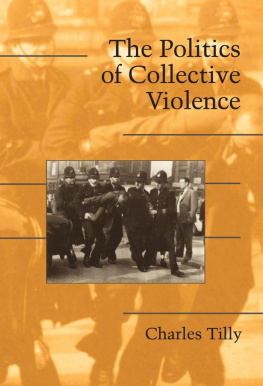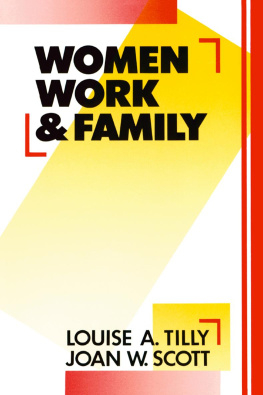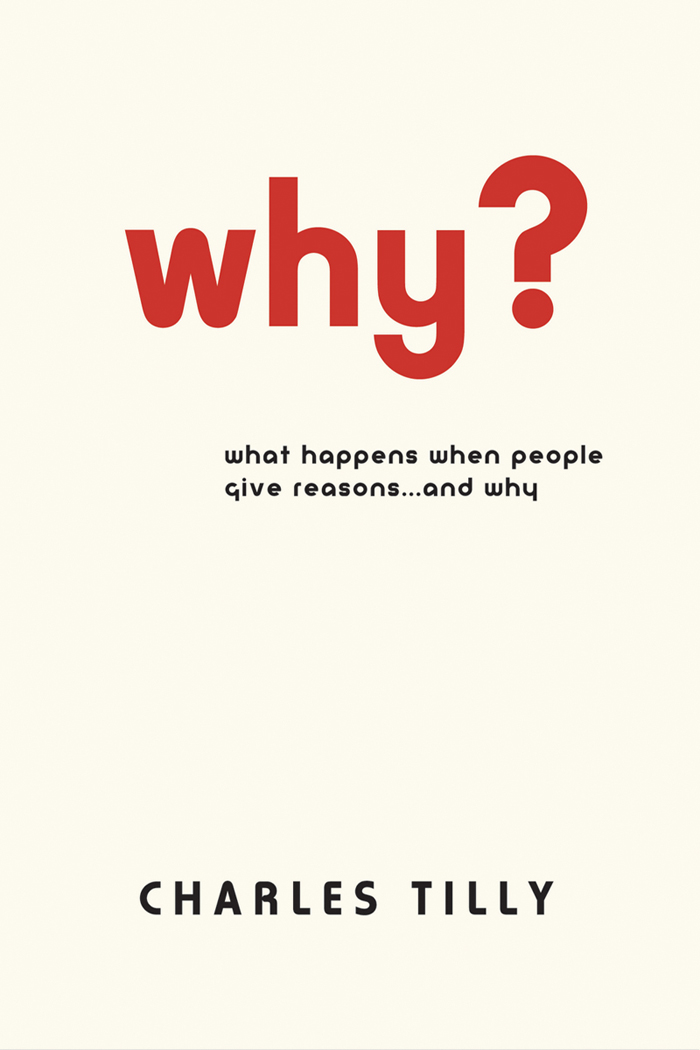why?
why?
CHARLES TILLY
PRINCETON UNIVERSITY PRESS
PRINCETON AND OXFORD
Copyright 2006 by Princeton University Press
Published by Princeton University Press, 41 William Street,
Princeton, New Jersey 08540
In the United Kingdom: Princeton University Press, 3 Market Place,
Woodstock, Oxfordshire OX20 1SY
All Rights Reserved
Library of Congress Cataloging-in-Publication Data
Tilly, Charles. Why? / Charles Tilly.
p. cm.
Includes bibliographical references and index.
ISBN-13: 978-0-691-12521-3 (hardcover : alk. paper)
ISBN-10: 0-691-12521-X (hardcover : alk. paper)
1. Attribution (Social psychology) 2. Explanation. 3. Causation.
4. Reasoning (Psychology) I. Title.
HM1076.T55 2006
302.12dc22 2005024363
British Library Cataloging-in-Publication Data is available
This book has been composed in Janson Text and Horatio Lt. Std. Display
Printed on acid-free paper. 
pup.princeton.edu
Printed in the United States of America
10 9 8 7 6 5 4 3 2 1
To my surviving siblings
and their life companions:
Rich, Elisabeth, Carolyn, Reg,
Steve, and Elizabeth
reasons enough
CONTENTS
PREFACE
Did you ever wonder why people give the reasons they do for what they have done, for what others have done to them, or more generally for what goes on in the world? I did, and ended up writing this book. Writing the book drove me off my usual course of analyzing large-scale political processes such as revolutions and democratization. Two different winds blew me off course.
First, noticing how mass media, students, and my fellow social scientists customarily explained complex social phenomena made me wonder why they focused so regularly on the decision making of a few influential actors while neglecting unanticipated consequences, incremental effects, and the incessant, subtle negotiation of social interaction. Both personal experience and professional studies of social processes, after all, had led me to think that people rarely accomplish exactly what they consciously plan, and constantly find events unrolling differently from what they anticipated. Why, then, do peoples descriptions and explanations of social processes overwhelmingly emphasize conscious deliberation?
Second, my own plaintive claim that most social processes more often resemble intense conversation than, say, soliloquies or a grand masters planning of chess moves somehow rarely persuaded anyone. Maybe that was because my own analyses dealt with too large a social scale. Or maybe it was because I hadnt thought hard enough about what it usually takes to make a description or explanation comprehensible and credible. For better or for worse, I decided to address the double challenge at book length. Here is the result.
I dont for a moment claim to have discovered that reason giving is a social activity, and that valid reasons therefore vary from one social situation to another. In the book, I draw explicitly on Aristotles ideas concerning poetics and rhetoric. If this were an academic treatise, I would surely also trace my line of argument back through American pragmatism via John Dewey and George Herbert Mead. In that lineage, the influential critic-philosopher Kenneth Burke insisted that words for motives actually describe situations, not inward states. Whimsically, Burke suggested that the claim even applied to dogs: A sleek young terrier in the country has a vocabulary of motives considerably different from that of a fat, coddled, overfed poodle in the city, whose only adventures are confined to candy and a constitutional on hard pavements (Burke 1989: 127). Different sorts of dogs acted out different reasons depending on their situations.
In a famous essay, sociologist C. Wright Mills picked up Burkes idea of a vocabulary of motives, spelled out its social side, and explicitly identified his own formulation with those of John Dewey. In much more stilted language than he used in his hard-hitting and widely read critiques of American life and governmental policy, Mills argued that
The generic situation in which imputation and avowal of motives arise, involves, first, the social conduct of the (stated) programs of languaged creatures, i.e. programs and actions oriented with reference to the actions and talk of others; second, the avowal and imputation of motives is concomitant with the speech form known as the question. Situations back of questions typically involve alternative or unexpected programs or actions of which phases analytically denote crises. The question is distinguished in that it usually elicits another verbal action, not a motor response. The question is an element in conversation. (Mills 1963: 440)
In this congested passage and later in the same essay, Mills came close to equating avowal and attribution of motives to the giving of reasons, and to saying that they always accomplish the social work of justification, rationalization, and repair.
Aside from harking back to Aristotle now and then, the book you have before you spends almost no words laying out detailed theories, tracing their genealogies, or marking my agreements or differences with other theorists. The chapter on conventions does, it is true, say something about how the perceptive sociologist Erving Goffman treated similar matters. I also cheat a bit by slipping citations of academic works, including my own, into the text when a difficult point arises. I slip in those citations to help students who want to follow up intriguing ideas and specialists who wonder where I got those ideas. But instead of showing how my arguments articulate with previous work on reason giving, I have concentrated here on helping readers understand how reasons figure in social situations they encounter all the time. The acid test of the books value is not whether it improves on the existing literature, but rather whether people who have read it see their own and other peoples answers to the question Why? more clearly, or at least differently, than before.
Along the way, Andrew Abbott, Aaron Cicourel, Lynn Eden, Mona El-Ghobashy, Jack Katz, Douglas Mitchell, Katherine Newman, David Rothman, Robert Courtney Smith, Laura Tilly, Viviana Zelizer, and two anonymous readers offered me indispensable criticism, information, advice, and encouragement. Tim Sullivans enthusiasm for publishing the book buoyed my spirits through a tortuous review process. Jon Munks copyediting adroitly combined a quick eye and a light hand. An early version of appeared as Reasons Why, Sociological Theory 22 (2004), 445455; material from that article reappears here with permission of the American Sociological Association.
why?
WHY GIVE REASONS?
The first observers simply tried to figure out what was happening. On the morning of September 11, 2001, at 8:19 AM, flight attendant Betty Ong called American Airlines Southeastern Reservations Office in Cary, North Carolina. She phoned from American Flight 11, which had left Boston for Los Angeles at 8 AM. In North Carolina, Ong reached Nydia Gonzalez. Ong told Gonzalez that hijackers had taken over their flight, had stabbed two other flight attendants, had killed at least one passenger, and had sprayed her and others with a substance that made their eyes burn and gave them trouble breathing (9/11 Report 2004: 5).
At 8:27, Gonzalez relayed Ongs call to Craig Marquis, duty manager at American Airlines operations center in Forth Worth, Texas. At about the same time, air traffic controllers reported that the flight had made a sharp turn south near Albany, New York. Theyre going to New York! Mr. Marquis remembers shouting out. Call Newark and JFK and tell them to expect a hijacking, he ordered, assuming the hijackers would land the plane. In my wildest dreams, I was not thinking the plane was going to run into a building, Mr. Marquis says (CBS News 2002: 47). Veteran duty manager Marquis reasonably mapped the hijacking of Flight 11 into vivid previous episodes during which captors had demanded money, asylum, or release of political prisoners. They had grabbed the plane, he supposed, to hold the aircraft, its crew, and its passengers hostage for concessions. At nearly the same time, Boston air traffic controllers were telling the Federal Aviation Administrations Command Center that hijackers had probably taken over the plane (Duenes et al. 2004: A16). Continuing her whispered chronicle of events aboard the aircraft, at 8:38 Betty Ong reported that the plane was descending. Her call was cut off abruptly at 8:44 (9/11 Report 2004: 6).










